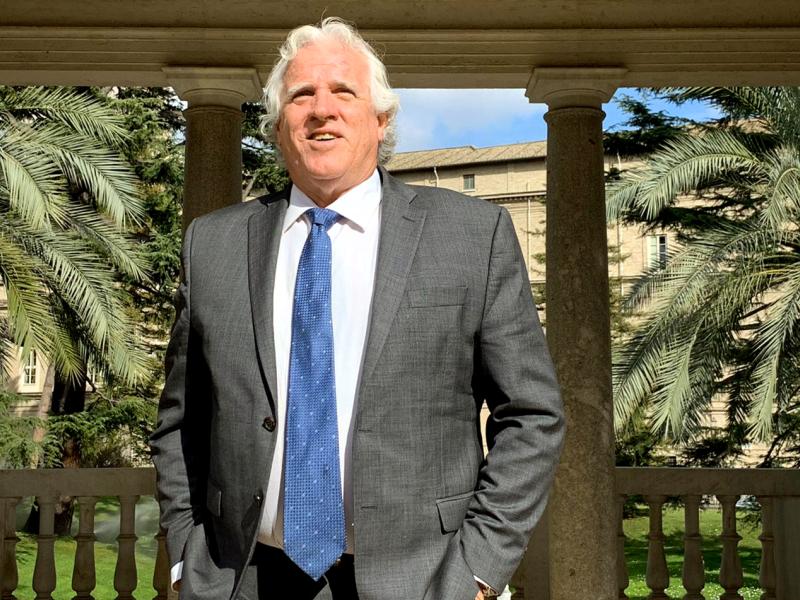Final Statement of the Workshop (Casina Pio IV, 4-5 March 2019)
The Chancellor of the Pontifical Academy of Social Sciences, in collaboration with the International Transport Workers' Federation (ITF), hosted the first summit of transport union leaders, manufacturers and technologists from around the world at the Casina Pio IV in the Vatican on the 4-5 March 2019. The delegation consisted of representatives from the ITF and its affiliated unions, Deloitte, Transdev, MSC Shipping, Nuovo Trasporto Viaggiatori, Volvo, General Motors, Securing Americas Future Energy, Daimler Financial and Mobility Services.
The summit addressed some of the biggest challenges facing contemporary society, including promotion of social, economic and environmental justice and concluded with an agreement to develop a work programme to implement a collective response to these challenges. The statement below summarises the discussion from the summit:
Introduction
The aim of the first summit was to create a group of responsible industry actors to build global awareness around challenges involving the transport sector as well as the rest of society: modern day slavery, human trafficking, exploitation of labour, automation and climate change. Laudato Si’, the second encyclical of Pope Francis, coupled with the 2030 Agenda for Sustainable Development offer trade unions, businesses and governments a framework to act collectively to address the challenges and opportunities that these issues present. Together with the Catholic Church, we commit to continuing the dialogue at the International, National and Local levels to protect and promote human and labour rights as a means to fight for justice in these matters.
Freedom of association, the right to organize, collective bargaining and collective action are fundamental human rights. Trade union organisations have always played a leading role in the construction of new models of environmental, economic, social and integral development and promoting new ways of working. These efforts must be carried out in cooperation with relevant industry and social partners.
2030 Agenda for Sustainable Development
The 2030 Agenda for Sustainable Development sets the global development priorities for the 193 UN member states. Within Agenda 2030 are the 17 Sustainable Development Goals (SDGs), to which all countries have committed. The 17 SDGs call for the end of extreme poverty (SDG 1); universal health coverage (SDG 3); quality education for all children (SDG 4); gender equality (SDG 5); decent work for all (SDG 8); the reduction of inequalities in and among nations (SDG 10); the end of human-induced climate change (SDG 13); the rule of law, with effective public institutions (SDG 16); and other goals.
These goals and associated targets and indicators provide us all with a global framework for action and we should strive to do all we can to deliver the SDGs at the national, regional and international levels. Strengthening the multilateral system through genuine dialogue and cooperation will help renew the social contract between governments and citizens and to build just and sustainable solutions. Intellectuals, business leaders, employers, civil society organisations, international organisations and especially the governments of nations, must take collective responsibility to deliver social and economic justice both now and in the future.
Climate justice
Climate change, the growing scarcity of freshwater, the loss of biodiversity, and an overall decline in social bonds are inextricably linked. Never before has humanity hurt and mistreated our planet – “our common home” - as we have in recent generations. Human-induced climate change is a global crisis with profound environmental, social, economic, political implications.
If we act now and decisively, there is still a chance of stopping the most dangerous climate change, and achieving the goal set in the Paris Climate Agreement to keep global warming to below 1.5-degrees C. Expanding public transport running on zero-carbon electricity is an essential part of the fight to bring down greenhouse gas emissions and address climate change. Bold policies are needed, adapted to specific national and particularly city contexts. Achieving zero emissions in cities is only possible with an immediate and ambitious expansion of affordable, abundant, safe and reliable public transport globally and the rapid shift to zero-emission vehicles, both light-duty vehicles and trucks.
Building the public transport systems of the future can create millions of quality jobs throughout the value chain of infrastructure and transport. It can also bring previously marginalized groups into the world of work and provide more secure and skilled employment. Procurement for public transport has the potential to incorporate decent work standards as well as training and apprenticeships for women, youth, and marginalized communities.
In most of the world’s cities, there is a growing spatial mismatch between where work is available, and where poor and working class people live. Affordable, abundant, safe and reliable public transport is a critical and effective poverty reduction measure, enabling poor and working people to access paid and better quality employment.
We must also seek a just transition for workers in the existing transport sector and will strive to ensure that the transport workers of the future enjoy decent pay and conditions as well as employment stability. If transport-related emissions are to be reduced then many new jobs will be created. Transport workers in both the formal and informal transport workforce must be fully engaged in the planning and implementation of these expanded public systems. Workers who drive taxis and minibuses today have the skills and experience to staff the new public mobility services of the future.
New technologies and the future of work
Technology in the workplace, including automation, digitalisation and driverless technology is being used to replace, intensify and restructure labour processes. Its development and use has social costs as well as benefits. Technology in the workplace, including automation, digitalisation and driverless technology can be used to restructure labour processes. These new technologies can bring many important benefits in efficiency, environment, and safety. They can improve both transport services and work in the transport sector. Some technologies have the potential to make work more creative and fulfilling, by removing routine tasks. These technologies can also reduce the adverse environmental impacts of transport.
Yet today we experience an economy that accepts every advance in technology with a view to profit, without due concern for the potentially negative impacts on human beings. Workers and consumers should not accept the potentially high adverse social costs of digitalisation. The transition to and introduction of these new technologies should take into account the human element – including social costs, decreasing tax base, disruptions of work, and threats to public safety and or security. The only way to achieve this is to ensure that when there is the potential large-scale introduction of new technologies with potentially disruptive effects on workers and society, the changes should be introduced in consultation with and participation of labour unions, policy makers and social partners.
Technology undoubtedly plays an important role in forming our workplaces and societies. People generally, and workers specifically, should therefore benefit from and participate in technological development. When they do not participate, technology often benefits just a minority, while causing pain and dislocation for large segments of society. Technology cannot be divorced from the issue of political power because whoever has political power decides what how technologies are deployed, and who wins and who loses in the process. The owners of data are also powerful because a key part of today’s technological change is the ability to produce and analyse data. Big data can help make transport systems more efficient, but can also result in the loss of privacy and undue market and political power for those who control the data.
Democratic oversight of the digital technologies is key to sustainable development, especially when these technologies have the potential to undermine working conditions and reduce worker control. The balance of power between workers and employers will determine in whose interests these issues are resolved. Businesses, trade unions and governments must work together to ensure that the introduction of new technology will also put the human element at the center.
All workers will be impacted by automation and the introduction of new technology, but young people will be disproportionately impacted by new technology in the workplace. Technologies that are in experimental stage of development may well begin to achieve mass and scale within 10-15 years, meaning that the young workers of today will be mid-career when their impact is felt. Governments, policy makers and unions must work together to ensure there is proper preparation of skills and a just transition for all workers who will be adversely impacted by the changing nature of work, including measures to ensure lifelong education and reskilling of workers, protecting workers rights and not eliminating social benefits.
Eradicating modern slavery
Failure to share the benefits of growth, increased deregulation and the erosion of human rights, including labour and trade union rights, have contributed to the unprecedented levels of income inequality we see around the world - where 26 people own as much wealth as the poorest 3.75 billion people! Too many workers have been forced into precarious employment with no job security or social protection, including lack of retirement security and access to basic social benefits such as healthcare. In many parts of the world, transport – particularly urban passenger transport – is largely in the informal economy. In 2018, an estimated 62% of the total global workforce was employed in the informal economy. We must work to facilitate the transition to just, productive, and formal employment. Women are disproportionately affected today. Globally, three out of four young workers are employed in the informal market.
Modern slavery takes place around the world, in every industry and every sector, in the formal and informal economy. The 2017 report “Global Estimates of Modern Slavery” published by the International Labour Organization (ILO) estimated that 40 million people are victims of modern slavery, with an estimated 25 million people subjected to forced labour. These 25 million men, women and children are trafficked, held in debt bondage or work in slave-like conditions.
In 2017, the ITF Inspectorate collected USD $38 million in unpaid wages for seafarers. These figures, while staggering, are consistent and occur year after year. The ITF inspectorate further assisted in repatriating abandoned seafarers and providing basic food and supplies when irresponsible actors in the maritime industry do not respect collective agreements and labour rights. The issues are not isolated to the maritime industry. For example, in December 2018, headlines were made when trade unions exposed the mistreatment of Filipino drivers in Denmark. Exploiting loopholes in EU rules, irresponsible employers bring drivers to Europe from Manila to work for appallingly low wages ($1060 per month). This exploitation of workers must be addressed.
Deregulation, privatisation, subcontracting and erosion of trade union rights have created an environment that is ripe for worker exploitation. Multinational corporations at the top of the global supply chains need to be held accountable for their workers, and for the millions of workers that form parts of the global supply chain. The increased reliance on subcontracting has contributed to the conditions of unprecedented exploitation, even modern slavery. It is critical for multinational operators to work together with trade union and social partners to collectively establish minimum standards throughout all levels of the supply chain to ensure fair working conditions that provide workers with dignity and respect. Together, we must build accountability by developing environmental and social and governance (ESG) criteria that are measurable, reviewable and regulated appropriately in a national environment as well as the international environment.
Eradicating modern day slavery is intrinsically related to the elimination of violence at the workplace. Women are disproportionately impacted by violence at the workplace. We know that gender-based violence is epidemic and requires a systematic approach, which is why we must work collectively to ensure passage of International Labour Organization (ILO) convention on violence and harassment at work when it is considered for the second and final negotiation in the International Labour Conference (ILC) in June 2019. Passage of this convention provides both guidance and legal standards to prevent and address gender-based violence.
It is absolutely unacceptable and abhorrent that in the twenty-first century, with all the world’s riches, people continue to be trafficked and subjected to forced labour. Trade unions and businesses must work together with wider civil society to address and implement measures to prevent modern day slavery, eliminate violence in the workplace, ensure there is monitoring and enforcement of labour laws, and that guilty parties are held accountable at all levels when there are violations. These are the aims of the SDGs, and notable SDG 8.7: “to eradicate forced labour, end modern slavery and human trafficking and secure the prohibition and elimination of the worst forms of child labour, including recruitment and use of child soldiers, and by 2025 end child labour in all its forms.”
Conclusion
All parties in attendance commit to an ongoing dialogue to find a common ground to promote social justice, trade union rights, decent work, and equality in the context of modern transport and throughout society at large. We commit to the 17 Sustainable Development Goals, and notably the end of poverty, the end of all forms of modern slavery, and the end of human-induced climate change, as also requested by the Encyclical Laudato si’. We recognize that in order to deliver on these goals we need to have cooperation, trust and mutual respect. This will serve as the foundation to collectively respond to the new challenges that have been outlined during the summit. We can respond positively and actively to those challenges. We consider this the beginning of a relationship and our mutual responsibility will take us to the next level.




